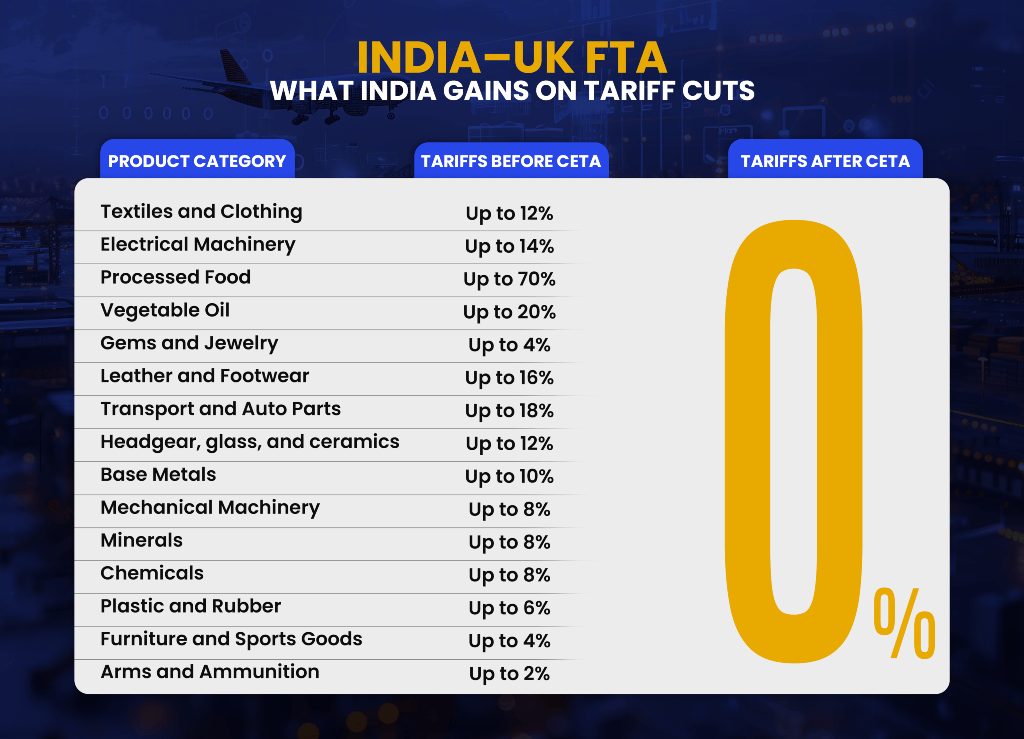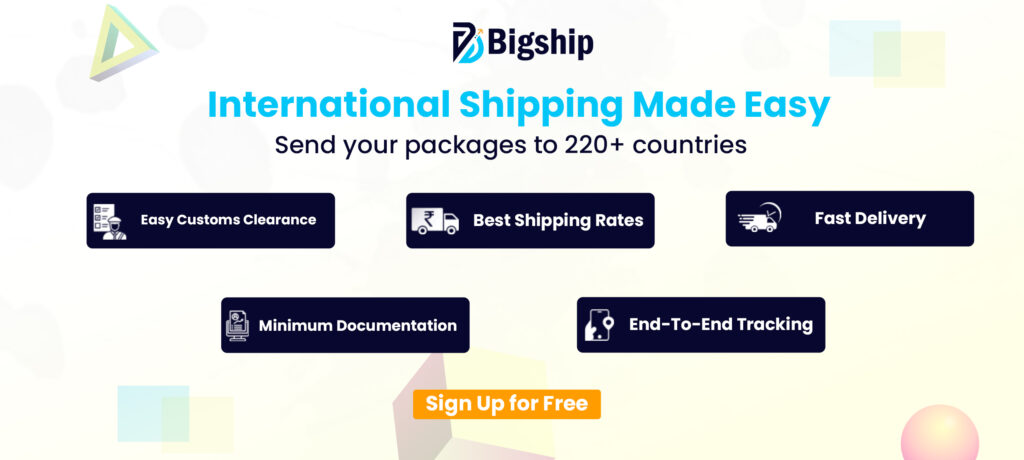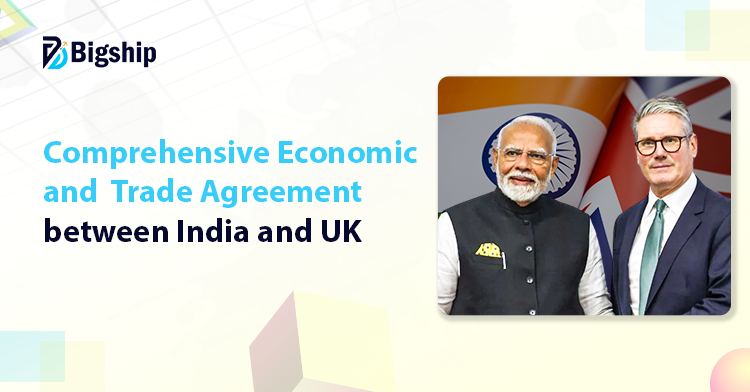India and the UK have signed a new free trade agreement, called the Comprehensive Economic and Trade Agreement (CETA). It was announced on July 24, 2025, during Prime Minister Modi’s visit to London. With annual trade already close to USD 56 billion, this deal is a big step for both sides.

For exporters in India’s textile industry, this is big news. Now, with no more high duties on Indian textile exports to the UK, there will be better margins and more orders. As a global courier aggregator, Bigship understands how important logistics is to this transformation.
Let’s explore how the FTA empowers the Indian textile industry and how we’re helping Indian exporters ship to the UK seamlessly.
Why India–UK Free Trade Agreement matters for the Indian textile export businesses?
The textile and clothing sector plays a key role in India’s exports, with major hubs like Tirupur, Surat, Ludhiana, Bhadohi, and Moradabad. The significance of this bilateral free trade agreement is as follows:
Zero import duty: The UK has removed the earlier 12% duty on Indian textile exports, thus making Indian products cheaper and more competitive.
Covers 1,143 product lines: This includes ready-made garments, home textiles, carpets, and handicrafts.
Fixes duty disadvantage: India now gets the same duty-free access as Bangladesh, Pakistan, and Cambodia.
Higher export potential: The UK imports USD 27 billion worth of textiles yearly, but India exports only USD 1.79 billion there, and this gap shows huge growth scope.
Boost for MSMEs: Smaller and medium-sized manufacturers can now enter the UK market without being blocked by high costs.
Chance to grow global share: India is currently the UK’s 4th-largest textile supplier with a 6.1% share. This deal helps us compete with China and Bangladesh.
Local impact: Textile hubs will likely see more orders, jobs, and business growth in the coming years.
Expected growth: This agreement could double India’s textile exports to the UK in the next 5 to 6 years and help capture 5% more market share.
New growth opportunities for India’s textile sector
The India–UK free trade agreement opens real doors for people and businesses, not just in big cities, but also across small towns and villages too. Here’s what it means:
Wider duty-free access: The agreement, under CETA, gives duty-free entry to 99% of India’s exports to the UK by covering nearly the entire trade value.
More jobs on the ground: As orders grow, there will be a rise in demand for tailors, weavers, packers, and helpers across the supply chain.
Support for women entrepreneurs: Many textile and craft businesses are led by women. More UK orders mean better incomes and long-term stability.
Upliftment of Indian artisans: Traditional Indian crafts, embroidery, and handwoven products can now reach a bigger market, giving artisans fresh hope.
Push for MSMEs: Smaller units, often left out due to high costs, can now compete fairly and grow with steady exports.
Stronger regional economies: Textile hubs like Tirupur, Bhadohi, and Moradabad may see a rise in demand, which will further lead to more income, better infrastructure, and new job creation.
Who will gain from the India–UK Bilateral Trade Agreement?
The new India–UK Free Trade Agreement eliminates import duties across a wide range of sectors, benefiting both traditional and high-growth industries in India. Here’s who stands to gain:

Textile and clothing exporters: Earlier taxed up to 12%, now this sector enters the UK market duty-free.
Leather and footwear industry: With duties removed, which were earlier up to 16%, Indian leather products can now compete better in pricing.
Processed food and vegetable oils: These sectors faced heavy tariffs, up to 70% and 20% earlier, respectively, now they can tap into UK demand more easily.
Transport and auto component makers: Exporters now save up to 18% in duties, thus making Indian auto parts more attractive to UK buyers.
Electrical and mechanical machinery: These products, once taxed up to 14%, can now be shipped with zero duty, opening room for large orders.
Gems and jewelry: Duties of up to 4% are now gone, this will boost India’s jewel exports to the UK.
Chemical and engineering goods: Earlier taxed up to 8%, these high-potential industries now have full access to a key market.
Marine products and toy exporters: Labor-intensive sectors like these will see more exports and better pricing in the UK.
Bigship’s Role in Supporting Indian Textile Exporters
The India–UK Free Trade Agreement opens new doors for exporters, but making the most of it needs the right shipping partner. At Bigship, we help textile businesses ship to the UK at affordable rates with reliable, door-to-door delivery. Our reliable courier partners ensure faster timelines, and our customer support team stays connected with you till your shipment reaches you safely.
Dealing with customs and paperwork can often slow things down, and that’s where we step in. We assist with documentation, follow the FTA rules closely, and offer complete tracking until your shipment reaches the destination. It’s simple, smooth, and built to help your textile business grow.
Key Takeaways
- The 12% tariffs on Indian textile and clothing exports to the UK have been removed, making them duty-free.
- MSMEs and local textile units can now compete better in the UK market without being blocked by high tariffs.
- Craft-based and women-led businesses will benefit from more orders and better income.
- Cities like Tirupur, Surat, and Moradabad can expect more jobs and business activity due to increased exports.
- Apart from textiles, sectors like leather, gems, machinery, auto parts, chemicals, and processed foods will also see export growth.
Conclusion
The Comprehensive Economic and Trade Agreement (CETA) is a big step forward for textile exports from India. With zero import duties, it’s the right time for Indian businesses to explore new opportunities in the UK market. No matter how big or small your export business is, this deal can help you expand. Indian textile exports to the UK are expected to rise, and with the right support in shipping and logistics, that growth becomes easier and faster.
Sign up with Bigship and start sending your textiles to the UK.





